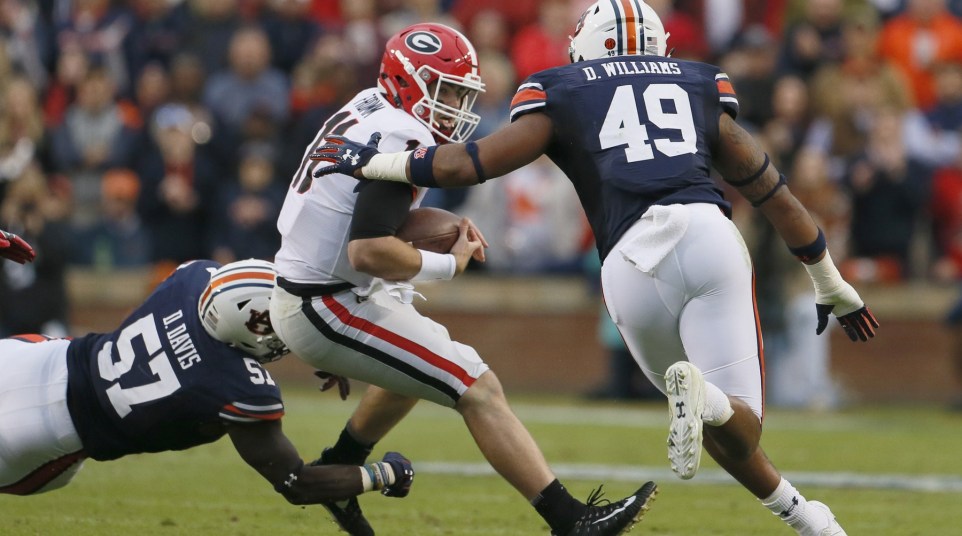
Did the lackluster SEC East stunt Georgia's upside?
Georgia has nobody to blame for Saturday’s loss but itself. Well, it could also blame Auburn for playing a nearly perfect game.
But there’s a difference between making excuses and finding the deeper meaning behind why a team performed so poorly. For the casual Georgia fan, Saturday was the exact situation that many feared. Facing a multi-possession deficit on the road against an extremely talented team, Kirby Smart’s squad showed all of its weaknesses.
It took Auburn to make that happen. It didn’t take Missouri. It didn’t take Florida. It definitely didn’t take Tennessee. South Carolina thought it could expose Georgia’s passing game weakness, but tough pregame talk was followed up by an admission that said weakness wasn’t as weak as it was originally perceived.
Nobody in the SEC East forced Georgia to play 60 minutes all season. On Saturday, the Dawgs couldn’t even play 45 minutes with Auburn.
Are the Tigers really that much better? Perhaps not, but we know that Auburn has been pushed on a more consistent basis than Georgia.

Credit: John David Mercer-USA TODAY Sports
Heading into Saturday, there was a good possibility that a Georgia loss would bring up the narrative about the SEC East clearly being weaker than the West. As of right now, that bet looks safer than ever. Even those who believe Georgia is for real — myself included — cannot deny how weak the non-Georgia teams in the East have been.
South Carolina is the only one of the Dawgs’ 5 East foes that has a positive scoring advantage in conference play:
- South Carolina +34
- Missouri -24
- Florida -54
- Tennessee -127
- Vanderbilt -155
Not surprisingly, those 5 teams lost to Georgia by an average of 29 points. South Carolina was the only squad that stayed within 3 scores. South Carolina was also the only squad that prevented Georgia from gaining 250 rushing yards.
Only one of those teams (Florida) ranked in the top 50 in FBS in total defense, too. But here’s the kicker. Here’s the “wow, I didn’t realize that” stat.
Look at where those 5 teams rank in total offense:
- Missouri, No. 15
- Florida, No. 110
- South Carolina, No. 113
- Vanderbilt, No. 117
- Tennessee, No. 124
So for a month of Georgia’s schedule, it faced one of the 20 worst offenses in college football (Kentucky and its No. 106 offense in FBS is up next for the Dawgs). Of course Georgia had something to do with that, but we’re 10 games into the season now. A bad offense is a bad offense.
Now let’s not act like Georgia loaded up on cupcake offenses all year. And obviously, the previously-top ranked Dawgs were No. 1 because they beat some good teams. Winning at Notre Dame and dominating Mississippi State certainly had a lasting impact on the selection committee.
But those two games were played in September. That MSU win was in Week 4. In the 6 weeks leading up to Auburn, the toughest game on Georgia’s slate was … South Carolina at home? When the Dawgs were supposed to be hitting their midseason stride, they faced teams that are now a combined 10-24 in conference play.
Being dominant is all well and good, but facing a proven top-25 team once a month would be nice, too. Unfortunately, the only non-Georgia East team that occupied a top-25 spot after Week 3 was Florida. Needless to say, the Gators weren’t anywhere near one of the top-25 teams in America.
The truth was that Georgia wasn’t going to be outplayed by any of those teams. None of their coaches were going to out-coach Smart, either. As much as Smart could preach perfection, his team could afford mistakes against lesser teams.
On Saturday, Georgia met its match. Really, it met a team it couldn’t match. It faced an Auburn team that had suffered a late collapse at LSU last month, and clearly learned from it.
Can Georgia learn from Saturday’s reality check at Jordan-Hare? Will that be the turning point in a national title run? Only time will tell. What we do know is that Smart took the blame for everything that happened at Auburn.
But he might’ve had some help from his East friends.
